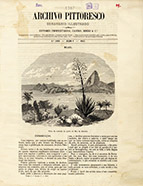

................................
This pedagogical mission, embedded in the very structure of the weekly, was evident in both the articles and the specific sections established within AP. As highlighted in Andrade-Ferreira's text, the 19th century saw frequent discussions on the role of this medium of communication. The distinct functions of books and newspapers, along with their educational potential, were closely analysed. This is why the civic and patriotic commitment to educating the population remained a guiding principle for AP. In an article from AP's second year, Nogueira da Silva observed that the newspaper had emerged as an alternative form of education for those who could not afford books due to financial limitations (AP, 1858, pp. 154-155). During its eleven-year run—especially in its early years—AP enjoyed positive reception for its publications on the history and customs of the colonies, other European nations, the Americas, and distant regions such as Indonesia, Australia, and Japan. Numerous articles on the fauna and flora of each continent appeared in its pages. Alongside these, there were texts comparing ancient and modern concepts; for example, the first issue included an analysis of a poem by Ovid. Biographical comparisons drew parallels between ancient Roman generals (the Caesars) and modern French Bonapartes, inspired by Plutarch’s approach, and excerpts from moral works by Plutarch and other ancient authors also featured prominently. This dialogue between ancient and modern ideas is noteworthy, as it highlights the complex issues that occupied 19th-century thinkers. The editors of AP emphasised clarity of purpose. An 1858 article, titled Os filósofos antigos, a moral e os tempos modernos [Ancient Philosophers, Morality, and Modern Times], drew a distinction between past moral instruction delivered orally and the role of the press in fulfilling this function in the 19th century. The effectiveness of ancient orators was seen as more impactful, particularly given that a large portion of society still lacked basic reading skills ( AP , 1858, pp. 180-181). This preference for rhetorical clarity reveals an enduring dialogue with the past. However, understanding the distinctly political charge that rhetoric carried for both ancient and modern audiences is essential. This challenge was evident in the frequent underlining of the newspaper's objectives, intended to keep its mission in focus. António Feliciano de Castilho summarised AP's primary goals as "amusement and variety” ( AP 1859, pp. 281-283). Repeatedly, it had to be emphasised that AP did not cover political issues. It is worth noting that the magazine’s educational foundation aligned with the context of consolidating liberal society, which, at the time, relied on building a solid national identity rooted in Portuguese cultural and historical elements. These guidelines reveal insights into the public environment of the Regeneration era and its engagement with the past.
This work is financed by national funds through FCT - Foundation for Science and Technology, I.P, in the scope of the projects UIDB/04311/2020 and UIDP/04311/2020.
